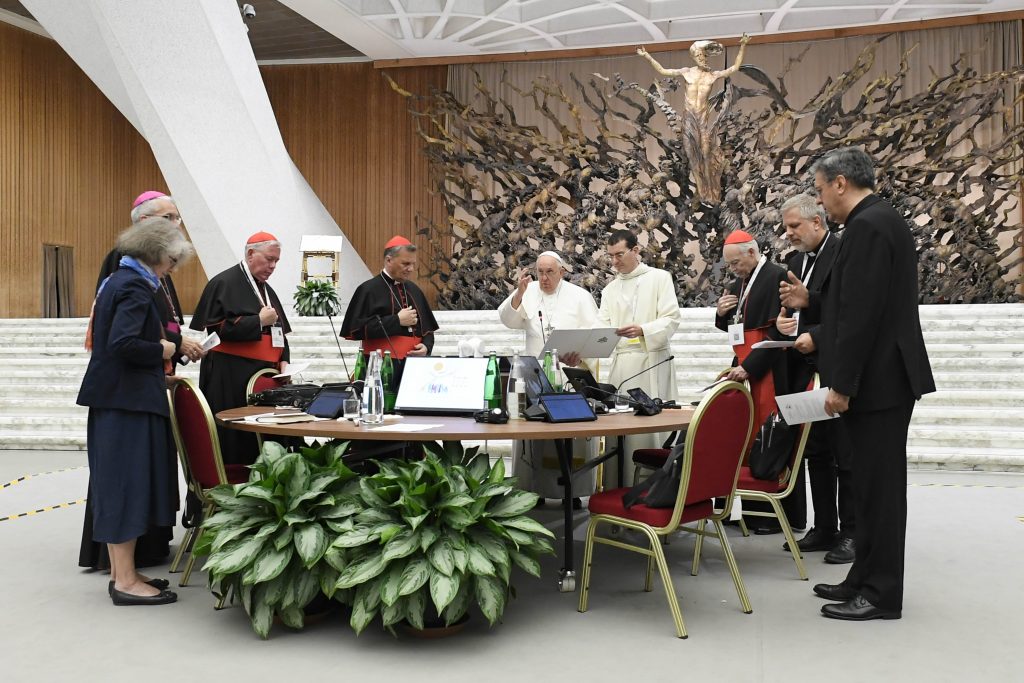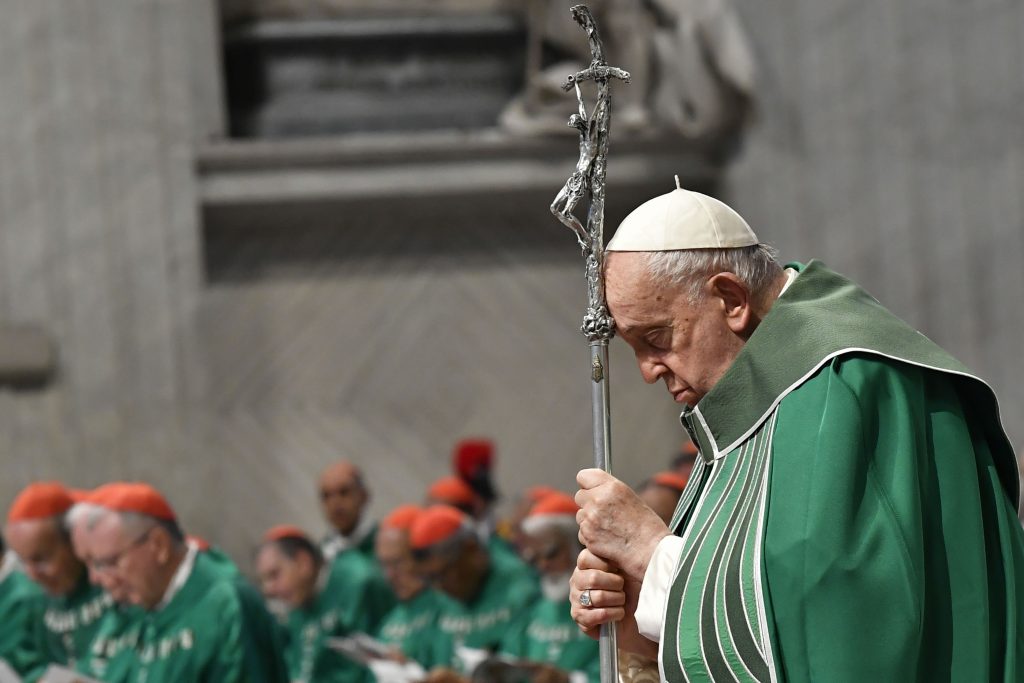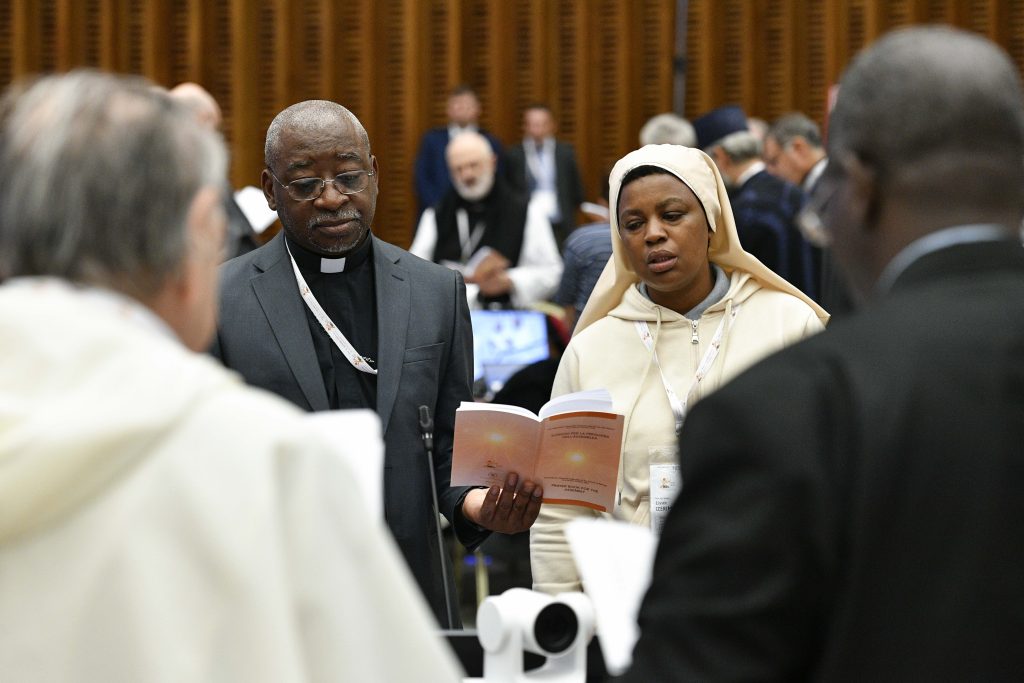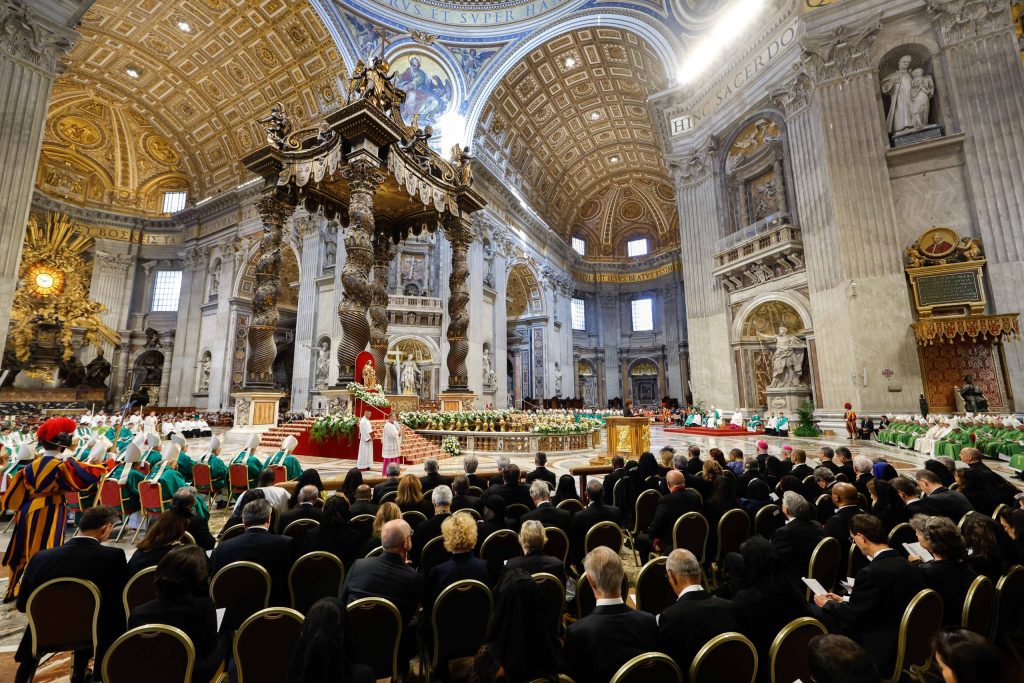October 31, 2023 // National
Pope at Synod: Wanting to ‘Control’ God Is Idolatry
VATICAN CITY (CNS) – To reform the Church is to put God first and adore Him, and to love and serve others, Pope Francis said at the Mass marking the conclusion of the first session of the Synod of Bishops on synodality.
“This is the Church we are called to ‘dream’: a Church that is the servant of all, the servant of the least of our brothers and sisters; a Church that never demands an attestation of ‘good behavior’ but welcomes, serves, loves, forgives; a Church with open doors that is a haven of mercy,” he said.

Cardinals and bishops join Pope Francis as he presides over Mass, marking the end of the first session of the assembly of the Synod of Bishops on synodality in St. Peter’s Basilica at the Vatican Oct. 29, 2023. (CNS photo/Lola Gomez)
“We may have plenty of good ideas on how to reform the Church, but let’s remember: To adore God and to love our brothers and sisters with His love, that is the great and perennial reform,” the pope said in his homily at Mass in St. Peter’s Basilica on Sunday, October 29.
Thousands of faithful stood at the beginning of Mass as synod members and participants processed into the basilica. The procession was led by non-ordained members followed by bishops and then cardinals. The synod on synodality marked the first time laypeople and women religious could take part as voting members. Of the total 364 members, close to 25 percent were “non-bishop members,” and 54 of them were women.
“Dear friends, the general assembly of the synod has now concluded,” the pope said in his homily. “Today we do not see the full fruit of this process, but with farsightedness we look to the horizon opening up before us.”
“The Lord will guide us and help us to be a more synodal and missionary Church, a Church that adores God and serves the women and men of our time, going forth to bring to everyone the consoling joy of the Gospel,” he said.

Pope Francis gives his blessing at the conclusion of the assembly of the Synod of Bishops’ last working session Oct. 28, 2023, in the Paul VI Hall at the Vatican. (CNS photo/Vatican Media)
As the Church concludes this stage of its journey, he said, “it is important to look at the ‘principle and foundation’ from which everything begins ever anew: love.
“Loving God with our whole life and loving our neighbors as ourselves,” he said, is “the heart of everything.”
The way to channel this love is to adore God and serve one another, he said.
“We have lost the habit of adoration,” the pope said, calling on all priests, dioceses, parishes, and communities to “return to worship” and adore the Lord. “Only in His presence will we be purified, transformed, and renewed by the fire of His Spirit.”
To adore God means “to acknowledge in faith that He alone is Lord and that our individual lives, the Church’s pilgrim way, and the ultimate outcome of history all depend on the tenderness of His love. He gives meaning to our lives,” he said.

Pope Francis prays while holding a crosier during Mass in St. Peter’s Basilica at the Vatican Oct. 29, 2023, marking the conclusion of the first session of the Synod of Bishops on synodality. (CNS photo/Vatican Media)
“We are always at risk of thinking that we can ‘control God,’ that we can confine His love to our own agenda. Instead, the way He acts is always unpredictable and consequently demands amazement and adoration,” Pope Francis said. The path of idolatry is “wanting the Lord to act according to the image we have of Him.”
He said the Church needs to be “a worshiping Church and a Church of service, washing the feet of wounded humanity, accompanying those who are frail, weak, and cast aside, going out lovingly to encounter the poor,” as God commanded.
“It is a grave sin to exploit the vulnerable, a grave sin that corrodes fraternity and devastates society,” he said, and, “as disciples of Jesus, we desire to bring to the world a different type of leaven, that of the Gospel.”
Synod’s Synthesis Report
A report summarizing discussions at the assembly of the Synod of Bishops said the Church may need more welcoming pastoral approaches, especially to people who feel excluded, but also acknowledged fears of betraying traditional Church teachings and practices.
Among the topics addressed in the report were clerical sexual abuse, women’s roles in the Church, outreach to poor, and the concept of “synodality” itself.
The assembly, with 364 voting members, including Bishop Rhoades, met in working sessions six days a week from Wednesday, October 4 to Saturday, October 28, after a three-day retreat outside of Rome before the synod began.
The assembly’s discussions set the stage for a yearlong period of reflection that will culminate in the second and final synod assembly in October of 2024 on the same topic.
The 41-page synthesis report, voted on paragraph-by-paragraph on October 28, described its purpose as presenting “convergences, matters for consideration, and proposals that emerged from the dialogue” on issues discussed under the headings of synodality, communion, mission, and participation.
Every item in the report was approved by at least two-thirds of the members present and voting, synod officials said. They published a complete list of the votes.
Within the synod topics, members looked at the role of women in the Church, including in decision making, and at the possibility of ordaining women deacons. The report asked for more “theological and pastoral research on the access of women to the diaconate,” including a review of the conclusions of commissions Pope Francis set up in 2016 and 2020.
The paragraph was approved 279-67, which was more than the needed two-thirds support but still garnered among the highest negative votes.
Assembly members also discussed pastoral approaches to welcoming and including in the life of parishes people who have felt excluded, including the poor, people with disabilities, LGBTQ+ Catholics, and Catholics whose marriages are not recognized by the Church.
The synthesis said that “to develop authentic ecclesial discernment in these and other areas, it is necessary to approach these questions in the light of the word of God and Church teaching, properly informed and reflected upon.”
The divergences in the assembly, it said, reflected opposing concerns: that “if we use doctrine harshly and with a judgmental attitude, we betray the Gospel; if we practice mercy ‘on the cheap,’ we do not convey God’s love.”

Members of the assembly of the Synod of Bishops gather for morning prayer Oct. 27, 2023, in the Paul VI Audience Hall at the Vatican. (CNS photo/Vatican Media)
Letter to the People of God
Participants in the Synod of Bishops closed their first session by writing a letter addressed to the People of God that stated the Church must continue discerning its future by listening to everyone, starting with the poorest and excluded.
The two-and-a-half-page letter, published on Wednesday, October 25, recounted the spirit and activities of the assembly’s first session and looked ahead to the assembly’s second session, expressing hope that the months leading up to October of 2024 “will allow everyone to concretely participate in the dynamism of missionary communion indicated by the word ‘synod.’”
“This is not about ideology, but about an experience rooted in the apostolic tradition,” members of the synod assembly wrote.
While the letter does not raise specific topics or questions to be addressed in the assembly’s next session, it did say that to “progress in its discernment, the Church absolutely needs to listen to everyone, starting with the poorest.”
“It means listening to those who have been denied the right to speak in society or who feel excluded, even by the Church,” the letter said, specifying the need to listen to victims of racism, particularly Indigenous populations. “Above all, the Church of our time has the duty to listen, in a spirit of conversion, to those who have been victims of abuse committed by members of the ecclesial body and to commit herself concretely and structurally to ensuring that this does not happen again.”
The letter also highlighted the “significant room for silence” made at Pope Francis’ invitation, meant to “foster mutual listening and a desire for communion in the Spirit among us.”
“Trust,” the synod assembly wrote, is what “gives us the audacity and inner freedom that we experienced, not hesitating to freely and humbly express our convergences, differences, desires, and questions.”
“Day by day, we felt the pressing call to pastoral and missionary conversion,” the assembly said. “For the Church’s vocation is to proclaim the Gospel not by focusing on itself, but by placing itself at the service of the infinite love with which God loved the world.”
The letter also shared that homeless people near St. Peter’s Square were asked about their expectations of the Church on the occasion of the synod and they replied: “Love!”

Pope Francis presides over Mass marking the end of the first session of the assembly of the Synod of Bishops on synodality in St. Peter’s Basilica at the Vatican Oct. 29, 2023. (CNS photo/Lola Gomez)
Synod Prays for Peace
Pope Francis asked Mary to look mercifully upon the human family, “which has strayed from the path of peace,” and entrusted to her protection the world’s regions and nations at war.
“Queen of Peace, you suffer with us and for us, as you see so many of your children suffering from the conflicts and wars that are tearing our world apart,” the pope said during a prayer service for peace in St. Peter’s Basilica on Friday, October 27.
“At this dark hour – this is a dark hour, Mother – we submerge ourselves in your luminous eyes, we entrust ourselves to your heart, sensitive to our problems,” he said, looking at an icon of Mary.
With a black-beaded rosary in hand, Pope Francis prayed with cardinals, bishops, and delegates of the assembly of the Synod of Bishops, recalling Mary’s strength and initiative from several Gospel scenes – the visitation, the wedding feast at Cana, Jesus’ passion and resurrection.
“Now, Mother, once more take the initiative for us, in these times rent by conflicts and waste by the fire of arms,” the pope said. “Teach us to cherish and care for life – each and every human life! – and to repudiate the folly of war, which sows death and eliminates the future.”
Pope Francis asked Mary to “touch the hearts of those imprisoned by hatred, convert those who fuel and foment conflict.”
“Queen of All Peoples, reconcile your children, seduced by evil, blinded by power and hate,” he said.
The best news. Delivered to your inbox.
Subscribe to our mailing list today.






